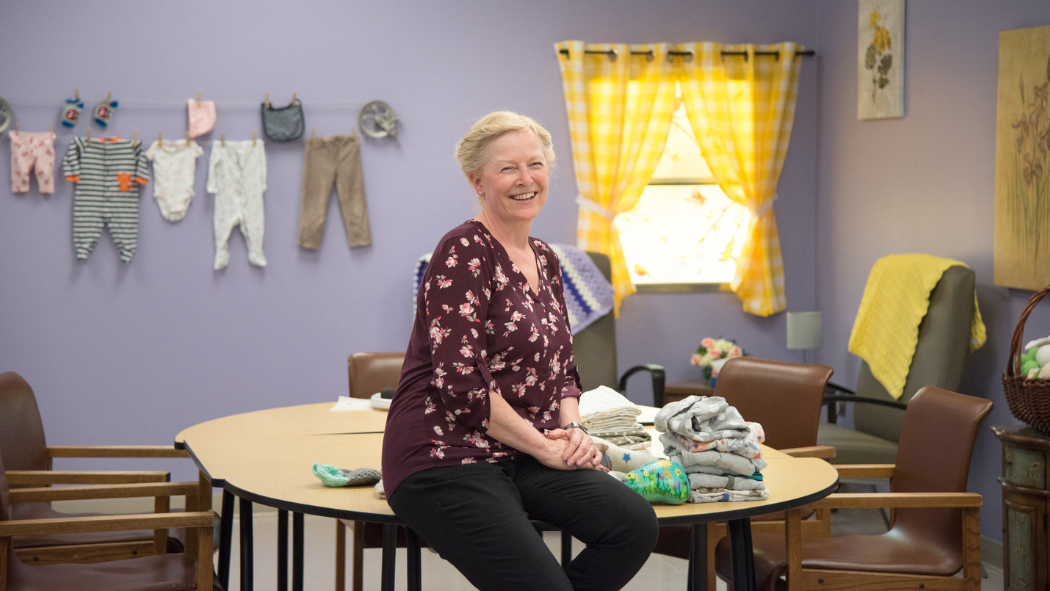
August 15, 2024
Meet Deb Lines, Recreational Therapist at London Health Sciences Centre’s (LHSC’s) University Hospital. Working with patients at the bedside in Inpatient Medicine’s Clinical Teaching Unit, Lines builds important relationships with those at risk of functional decline to learn who they are as individuals outside of the hospital and find unique ways to create individualized treatment plans to prevent physical and mental decline while they are in LHSC’s care.
“This can be a very overlooked patient population, who often live alone or with another frail individual and frequently lack important psychosocial supports,” says Lines. “In the hospital environment, the primary focus is on acute care and treating the medical condition. It’s especially important with this patient population that in addition to acute care, we care for them as a whole person recognizing their intellectual, emotional and spiritual needs.”
What the process looks like is different for every patient. For example, Lines might meet with a patient and learn they were an artist. Part of the individualized treatment plan is then to bring in watercolour paints that allow the patient to sit up or get out of bed and take on a creative task which will bring them joy and meaning.
Lines has a deep well of options to draw from that can be tailored to the needs of each patient, including, but not limited to:
- The use of iPads provided through Volunteer Services to find shows or music that bring a sense of normalcy from home for a patient;
- Fidget blankets, aprons and twiddle muffs that help keep hands busy and offer a cozy, warm feeling;
- A weighted real-life doll that provides calming once held and often opens the door to talk about their family and reminisce about their children;
- Activities like sorting, folding and matching baby socks;
- The use of a language library for English as a second language patients; and
- A variety of stimulating games and puzzles
“In terms of preventing delirium and its progression, there is so much value in finding those activities- for patients that stimulate the mind, break up what can be a very monotonous day, or help keep a normal routine,” says Lines. “Preventing decline not only helps decrease length of stay and the number of falls, it also increases patient and family satisfaction. And on a more human level, it demonstrates that we see our senior population as having differing needs and deserving of the same excellent care experience we strive to provide all patients.”
As patients are ready for discharge, Lines also connects them with appropriate community-based resources to continue that sense of community and prevent decline beyond LHSC’s walls.
Driving cultural change in our approach to care
LHSC is one of few acute care hospitals to integrate recreational therapy in the care of this patient population.
“The idea was initially borne out of our CTU Quality Improvement and Education Research hub as part of an overall effort to find ways where we can change the status quo and make improvements to how we deliver care,” says Audrey Wharton, Director, Inpatient Medicine Services at LHSC. “A series of sessions were held with members from our frontline teams, patients and care partners to look at why patients at risk of functional decline spend too much time in bed and we ultimately came up with a solution that was common in rehabilitation centres, but novel for inpatient acute care.”
As a result of integrating this role within the unit’s care team, the broader culture of care on the unit is shifting to a whole person view. Through the work Lines performs, frontline team members are getting a better glimpse into the kind of lives patients live outside of the hospital environment and the types of activities they would normally be doing at home.
Lines adds “My role provides a window into the lives of these patients beyond the medical process for frontline team members. Being able to recognize a patient as a capable person means we are better equipped as a team to deliver care that thoughtfully and respectfully treats the needs of the person as a whole.”
To date, there has been incredibly positive feedback from families who have seen the benefit of their loved one having regular contact, cognitive stimulation, and a continued sense of community while in-hospital. The program has also continued to expand since Lines first joined. With the recent addition of a second recreational therapist, Jennifer Bell, the program is now able to offer more individualized care, tailored to meet the unique needs of each patient.
“We are proud to have a team of dedicated professionals who are committed to this mission, and we look forward to continuing to serve patients with the highest level of care and compassion,” Wharton summarizes.
The Acute Care team extends their gratitude to the Academic Medical Organization of Southwestern Ontario (AMOSO) for their generous grant, which made the initiation of this program possible. This additional care would not have been established without their support.